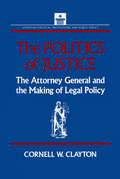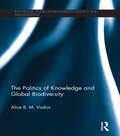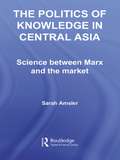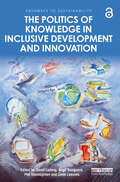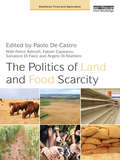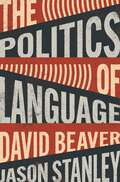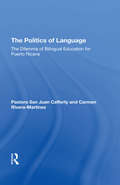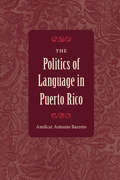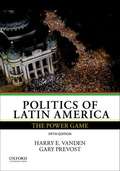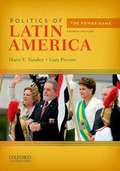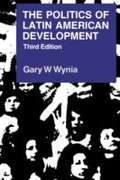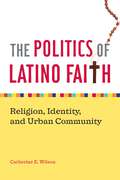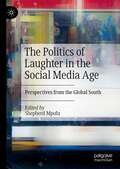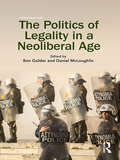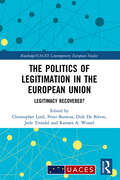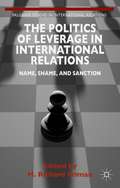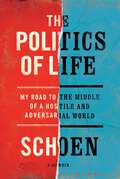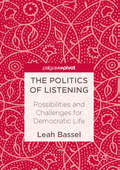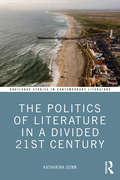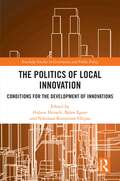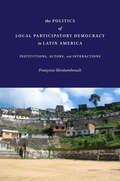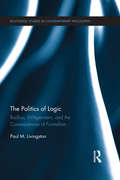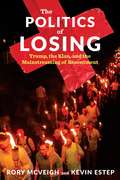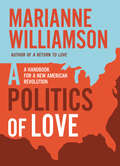- Table View
- List View
The Politics of Justice: Attorney General and the Making of Government Legal Policy
by Cornell W. ClaytonFirst Published in 2015. Routledge is an imprint of Taylor & Francis, an Informa company.
The Politics of Knowledge and Global Biodiversity (Routledge Studies in Biodiversity Politics and Management)
by Alice B.M. VadrotThe establishment of the Intergovernmental Platform on Biodiversity and Ecosystem Services (IPBES) points to the crucial role attributed to science and knowledge for the successful implementation of biodiversity politics by both scientists and policy-makers. With the increased importance of biodiversity in international politics, and in part inspired by the success the Intergovernmental Panel on Climate Change (IPCC) has had in raising awareness of global warming, the call for an ‘IPCC for Biodiversity’ was successful. The Politics of Knowledge and Global Biodiversity gives a full overview of the process of its implementation as finalised in 2013 and proposes an innovative conceptual framework that puts this specific case into a more general perspective of international politics and relations. It provides a detailed empirical analysis of the knowledge politics associated with the establishment of IPBES and its conceptual framework and methodological approach is grounded in a theoretical perspective. This pioneering work is the first to examine IPBES in this way and is essential reading for researchers and scholars of International Relations, Environmental and Biodiversity Politics, Science-Policy Interfaces and Global Environmental Governance. It will also be of interest to political scientists and social scientists.
The Politics of Knowledge in Central Asia: Science between Marx and the Market (Central Asia Research Forum)
by Sarah AmslerThrough careful historical and ethnographic research and extensive use of local scholarly works, this book provides a persuasive and careful analysis of the production of knowledge in Central Asia. The author demonstrates that classical theories of science and society are inadequate for understanding the science project in Central Asia. Instead, a critical understanding of local science is more appropriate. In the region, the professional and political ethos of Marxism-Leninism was incorporated into the logic of science on the periphery of the Soviet empire. This book reveals that science, organizes and constructed by Soviet rule, was also defined by individual efforts of local scientists. Their work to establish themselves ‘between Marx and the market’ is therefore creating new political economies of knowledge at the edge of the scientific world system.
The Politics of Knowledge in Inclusive Development and Innovation (Pathways to Sustainability)
by David Ludwig, Birgit Boogaard, Phil Macnaghten, and Cees LeeuwisThis book develops an integrated perspective on the practices and politics of making knowledge work in inclusive development and innovation. While debates about development and innovation commonly appeal to the authority of academic researchers, many current approaches emphasise the plurality of actors with relevant expertise for addressing livelihood challenges. Adopting an action-oriented and reflexive approach, this volume explores the variety of ways in which knowledge works, paying particular attention to dilemmas and controversies. The six parts of the book address the complex interplay of knowledge and politics, starting with the need for knowledge integration in the first part and decolonial perspectives on the politics of knowledge integration in the second part. The following three parts focus on the practices of inclusive development and innovation through three major themes of learning for transformative change, evidence, and digitisation. The final part of the book addresses the governance of knowledge and innovation in the light of political struggles about inclusivity. Exploring conceptual and practical themes through case studies from the Global North and South, this book will be of great interest to students, scholars, and practitioners researching and working in development studies, epistemology, innovation studies, science and technology studies, and sustainability studies more broadly.
The Politics of Land and Food Scarcity (Earthscan Food and Agriculture)
by Paolo De CastroIn recent years the issue of food security has become centre stage in the global agenda. Since the 2007/8 food price crisis, a number of works have been published on the topic, addressed from various perspectives: economic, social and cultural, environmental, agronomic and climate change. Very rarely is there a comprehensive approach, which also includes the crucial issue of politics. Through a multidisciplinary approach, this book provides an overview of the new global challenges connected with land, food supply and agriculture. It also contributes to engagement in a new global food policy, through a political analysis of land and food scarcity, including 'land grabs' by affluent countries in poorer nations. It does not simply raise the debate; rather it aspires to move forward the debate that has started with the G20 meetings. It discusses how national governments, local agricultural policies and supranational entities are facing the new scenario of feeding a growing population when land resources are limited and subject to competing claims.
The Politics of Language
by David Beaver Jason StanleyA provocative case for the inherently political nature of languageIn The Politics of Language, David Beaver and Jason Stanley present a radical new approach to the theory of meaning, offering an account of communication in which political and social identity, affect, and shared practices play as important a role as information. This new view of language, they argue, has dramatic consequences for free speech, democracy, and a range of other areas in which speech plays a central role.Drawing on a wealth of disciplines, The Politics of Language argues that the function of speech—whether in dialogue, larger group interactions, or mass communication—is to attune people to something, be it a shared reality, emotion, or identity. Reconceptualizing the central ideas of pragmatics and semantics, Beaver and Stanley apply their account to a range of phenomena that defy standard frameworks in linguistics and philosophy of language—from dog whistles and covert persuasion to echo chambers and genocidal speech. The authors use their framework to show that speech is inevitably political because all communication is imbued with the resonances of particular ideologies and their normative perspectives on reality.At a time when democracy is under attack, authoritarianism is on the rise, and diversity and equality are being demanded, The Politics of Language offers a powerful new vision of the language of politics, ideology, and protest.
The Politics Of Language: The Dilemma Of Bilingual Education For Puerto Ricans
by Pastora Cafferty Carmen Rivera-MartinezDemographers predict that by the end of the century Spanish-speaking persons will constitute the largest minority group in the United States--in this context, bilingual education must be considered a crucial issue for educators and policymakers at the state, national, and local levels. Professors Cafferty and Rivera-Martínez analyze bilingual education policies and programs, particularly as they affect the Puerto Rican child, and reach some startling conclusions. They find that these programs do not, despite the best intentions, offer the equal opportunity and social mobility that has been their purpose. While the authors attempt to neither examine nor define the general problem of bilingual education methodology, they do address the problem of educating the Puerto Rican child as one minority among many. They suggest alternatives for solving the problem and recommend specific policies for federal, state, and local governments attempting to integrate Spanish-speaking minorities into the educational process.
The Politics of Language in Puerto Rico
by Amílcar BarretoThis is the first book in English to analyze the controversial language policies passed by the Puerto Rican government in the 1990s. It is also the first to explore the connections between language and cultural identity and politics on the Caribbean island. Shortly after the U.S. invasion of Puerto Rico in 1898, both English and Spanish became official languages of the territory. In 1991, the Puerto Rican government abolished bilingualism, claiming that "Spanish only" was necessary to protect the culture from North American influences. A few years later bilingualism was restored and English was promoted in public schools, with supporters asserting that the dual languages symbolized the island’s commitment to live in harmony with the United States. While the islanders’ sense of ethnic pride was growing, economic dependency enticed them to maintain close ties to the United States. This book shows that officials in both San Juan and Washington, along with English-first groups, used the language laws as weapons in the battle over U.S.-Puerto Rican relations and the volatile debate over statehood. It will be of interest to linguists, political scientists, students of contemporary cultural politics, and political activists in discussions of nationalism in multilingual communities.
Politics of Latin America: The Power Game
by Harry E. Vanden Gary PrevostNow in its fifth edition, Politics of Latin America explores both the evolution and the current state of politics in Latin America. Distinguishing itself from more traditional works on the subject, this unique text demonstrates a nuanced sensitivity to the use and abuse of power and the importance of social conditions, gender, race, globalization, class, and political economy throughout Latin America. The first part of the text features thematic chapters that outline the region's geographic setting, history, economics, society, gender, race, and religion, setting the stage for a more detailed analysis of the politics, democratization, political culture, political movements, and revolution in Latin America, along with U. S. -Latin American relations. The second part of the book consists of carefully constructed case studies of ten representative Latin American nations: Mexico, Argentina, Brazil, Chile, Colombia, Venezuela, Bolivia, Cuba, Guatemala, and Nicaragua. Each case study traces the historical and political development of key actors and institutions, analyzing contemporary power configurations.
Politics of Latin America: The Power Game (4th Edition)
by Harry E. Vanden Gary PrevostThis fourth edition of Politics of Latin America explores both the evolution and the current state of the political scene in Latin America. Distinguishing itself from more traditional works on the subject, this text demonstrates a nuanced sensitivity to the use and abuse of power and the importance of social conditions, gender, race, globalization, and political economy throughout Latin America.
The Politics Of Latin American Development
by Gary W. WyniaThis popular introduction to Latin American politics probes behind the current events and reveals the fundamental economic and political dynamics shaping events and driving policy. Using the paradigm of politics as a game, domestic and foreign players are identified and the rules that govern their interaction are described. <P><P>This analytical framework is then used in detailed analyses of the strategies of development that have dominated Latin American politics. Chapters are devoted to democratic reform, military authoritarianism, and revolutionary politics with detailed examples from Argentina, Brazil, Chile, Cuba, Mexico, Nicaragua, Peru, and Venezuela. <P><P>This third edition brings all national cases up to date, analyzing the rise of democratic governance as well as the challenges presented by unprecedented foreign debts. Special attention is given to the restoration of constitutional democracy in Argentina and Brazil, and a systematic comparison of the movements in those countries is developed. More information and analysis on Cuba and Nicaragua are provided and emphasis is given to the 1988 election in Mexico. New material on the foreign debt crisis, the Roman Catholic Church, and the armed forces is also given.
The Politics of Latino Faith: Religion, Identity, and Urban Community
by Catherine E. WilsonPundits and commentators are constantly striving to understand the political behavior of Latinos--the largest minority in the United States and a key voting block. As Catherine E. Wilson makes clear in The Politics of Latino Faith, not only are Latinos a religious community, but their religious institutions, in particular faith-based organizations, inform daily life and politics in Latino communities to a considerable degree.Timely and discerning, The Politics of Latino Faith is a unique scholarly work that addresses this increasingly powerful political force. As Wilson shows, Latino religious institutions, whether congregations or faith-based organizations, have long played a significant role in the often poor and urban communities where Latinos live.Concentrating on urban areas in the South Bronx, Philadelphia, and Chicago, she provides a systematic look at the spiritual, social, and cultural influence Latino faith-based organizations have provided in American life. Wilson offers keen insight into how pivotal religious identity is in understanding Latino social and political involvement in the United States. She also shows the importance of understanding the theological underpinnings at work in these organizations in order to predict their political influences.
The Politics of Laughter in the Social Media Age: Perspectives from the Global South
by Shepherd MpofuThe Politics of Laughter in the Social Media Age: Perspectives from the Global South brings to critical and intellectual attention the role of humour in the digital era in the Global South. Many citizens of the Global South live disempowered and precarious lives. Digital media and humour, as chapters in the volume demonstrate, have empowered these citizens through engagement with power and their peers, enabling a pursuit of a better future. Contributors to the volume, while alive to challenges associated with the digital divide, highlight the potentials of social media and humour to engage and seek redress on issues such as corruption, human rights violations, racism and sexism. Contributors expertly analyse memes, videos, cartoons and other social media texts to demonstrate how citizens mimic, disrupt, ridicule and challenge status quo. This book caters for academics and students in media and communication studies, political studies, sociology and Global South studies.
The Politics of Legality in a Neoliberal Age
by Ben Golder Daniel McLoughlinThis volume addresses the relationship between law and neoliberalism. Assembling work from established and emerging legal scholars, political theorists, philosophers, historians, and sociologists from around the world – including the Americas, Australia, Europe, and the United Kingdom – it addresses the conceptual, legal, and political relationships between liberal legality and neoliberal economics. More specifically, the book analyses the role that legality plays in the dominant economic force of our time, offering both a legal corrective to scholarship in economics and political economy that has paid insufficient attention to legal ideas, and, at the same time, a political economic corrective to legal scholarship that has only recently turned to theorizing neoliberalism. It will be of enormous interest to those working at the intersection of law and politics in our neoliberal age.
The Politics of Legitimation in the European Union: Legitimacy Recovered? (Routledge/UACES Contemporary European Studies)
by Christopher LordThis book examines and investigates the legitimacy of the European Union by acknowledging the importance of variation across actors, institutions, audiences, and context. Case studies reveal how different actors have contributed to the politics of (re)legitimating the European Union in response to multiple recent problems in European integration. The case studies look specifically at stakeholder interests, social groups, officials, judges, the media and other actors external to the Union. With this, the book develops a better understanding of how the politics of legitimating the Union are actor-dependent, context-dependent and problem-dependent. This book will be of key interest to scholars and students of European integration, as well as those interested in legitimacy and democracy beyond the state from a point of view of political science, political sociology and the social sciences more broadly.
The Politics of Leverage in International Relations
by H. Richard FrimanThis unique volume unpacks the concept and practice of naming and shaming by examining how governments, NGOs and international organisations attempt to change the behaviour of targeted actors through public exposure of violations of normative standards and legal commitments.
The Politics of Liberty in England and Revolutionary America
by Lee WardThis study locates the philosophical origins of the Anglo-American political and constitutional tradition in the philosophical, theological, and political controversies in seventeenth-century England. By examining the quarrel it identifies the source of modern liberal, republican and conservative ideas about natural rights and government in the seminal works of the Exclusion Whigs Locke, Sidney, and Tyrrell and their philosophical forebears Hobbes, Grotius, Spinoza, and Pufendorf. This study illuminates how these first Whigs and their diverse eighteenth-century intellectual heirs such as Bolingbroke, Montesquieu, Hume, Blackstone, Otis, Jefferson, Burke, and Paine contributed to the formation of Anglo-American political and constitutional theory in the crucial period from the Glorious Revolution through to the American Revolution and the creation of a distinctly American understanding of rights and government in the first state constitutions.
The Politics of Life: My Road to the Middle of a Hostile and Adversarial World
by Douglas E SchoenDuring his more than 50 years in politics, Democratic strategist Douglas E. Schoen has produced nearly two dozen books that have deftly dissected national and international crises and offered prescriptions for solving them. Now, in The Politics of Life: My Road to the Middle of a Hostile and Adversarial World, Schoen delivers his most personal work. Bringing to life the antiwar youthquake of his Harvard years, Schoen introduces us to Cornel West, Walter Isaacson, Merrick Garland, and other classmates bound for glory. A tense summer in Mississippi helps Schoen appreciate the long game of candidate Charles Evers, a bootlegger-pimp turned civil rights crusader. In New York, he witnesses the twilight of clubhouse power as he canvasses for society swell Carter Burden, &“mob priest&” Louis Gigante, and Ed (How&’m doin&’?) Koch. Taking time out for his own run for Congress, Schoen joins data wunderkind Mark Penn in pioneering overnight polling – getting to know everyone from Camelot heir Ted Kennedy to crack-smoking mayor Marion Barry to a brash developer named Donald Trump. Penn & Schoen evolves into a global consultancy, taking on strongmen in Serbia, Mexico, Zimbabwe, Turkey, and Venezuela. Two of its clients are assassinated. Three win the Nobel Peace Prize. In 1996, the duo guides beleaguered President Bill Clinton to a second term and through a wrenching sex scandal. Using a unique strategy for micro-targeting voters, the firm helps give Mayor Michael Bloomberg the time he needs to steer New York City to a recovery after 9/11.A HALF-CENTURY IN POLITICS WAR STORIES AND WISDOM Schoen seems to be on top of the world when a British multinational pays a fortune for Penn & Schoen. Out on his own, he shrugs off a new generation of progressives who mock his centrist views and his willingness to debate conservatives on Fox News. Gradually, he reinvents himself. He becomes a syndicated columnist, co-founds a new polling company, immerses himself in Ukraine&’s struggle against Russia, and saddles up again with Michael Bloomberg to help oust now-President Trump. Along the way, some former critics admit Schoen might have been right. Brimming with ripping yarns from campaign war rooms, The Politics of Life is also a manual for living a productive and happy life. Sprinkled through the memoir are the author&’s &“Schoenisms&” – lessons he&’s learned the hard way: • It helps if your opinion is correct. But first, it should sound convincing. • Take on a despot when he first threatens you. Bullies only get bigger. • Martyrdom is overrated. Don't fall on any swords unless there&’s an ambulance on the way. • Shaming and blaming your opponents might impress your allies. But it doesn&’t accomplish much – aside from chasing people away from the bargaining table. • Don&’t waste time on feuds. Grudges sap your strength and hurt you almost as much as the person you&’re fighting. • Most people are mixtures of light and darkness. Life is about learning the moral gradients – the grayscale – and deciding how much shadow you can live with.
The Politics of Listening
by Leah BasselThis book explores listening as a social and political practice, in contrast to the more common focus on voice and speaking. The author draws on cases from Canada, France and the United Kingdom, exploring: minority women and debates over culture and religion; riots and young men in France and Engl∧ citizen journalism and the creative use of different media; and solidarity between migrant justice and indigenous activists. Analysis across these diverse settings considers whether and how a politics of listening, which demands that the roles of speakers and listeners change, can be undertaken in adversarial and tense political moments. The Politics of Listening argues that such a practice has the potential to create new ways of being and acting together, as political equals who are heard on their own terms. The book will appeal to students and scholars across a range of disciplines, including sociology and political theory.
The Politics of Literature in a Divided 21st Century (Routledge Studies in Contemporary Literature)
by Katharina DonnHow does literature matter politically in the 21st century? This book offers an ecocritical framework for exploring the significance of literature today. Featuring a diverse body of texts and authors, it develops a future-oriented politics embedded in those transgressive realities which our political system finds impossible to tame. This book re-imagines political agency, voices, bodies and borders as transformative processes rather than rigid realities, articulating a ‘dia-topian’ literary politics. Taking a contextual approach, it addresses such urgent global issues as biopolitics, migration and borders, populism, climate change, and terrorism. These readings revitalize fictional worlds for political enquiry, demonstrating how imaginative literature seeds change in a world of closed-off horizons. Prior to the pragmatics of power-play, literary language breathes new energy into the frames of our thought and the shapes of our affects. This book shows how relation, metamorphosis and enmeshment can become salient in a politics beyond the conflict line.
The Politics of Local Innovation: Conditions for the Development of Innovations (Routledge Studies in Governance and Public Policy)
by Hubert HeineltSome cities manage to mobilize innovation potentials and respond to challenges, such as demographic change and immigration as well as economic restructuring, while others do not. This book solves this problem by answering the following question: what are the conditions for the development of local innovation? In order to identify these conditions, the book explores case study cities which are perceived as success cases of local innovation by the respective local community, and sometimes also nationally or internationally. The conditions for local innovations are not sought primarily in economic, social, or institutional circumstances. Instead, this book focuses on the communicative interactions by which local actors develop locally embedded knowledge or a specific social imaginary about those circumstances, as well as the constraints and opportunities deriving from them. The authors focus on a comparative case study of ten cities—Bensheim, Frankfurt, Kassel, Leipzig, and Offenbach in Germany, and Athens, Chania, Elefsina, Kalamata, and Thessaloniki in Greece. The book is based on content analysis of policy documents and local newspapers as well as in-depth interviews with key local actors. This book will be of interest to scholars and students of political science and policy analysis, as well as sociology, geography, urban studies, and planning. It will also interest local politicians and bureaucrats concerned with achieving innovation in cities.
The Politics of Local Participatory Democracy in Latin America
by Françoise MontambeaultParticipatory democracy innovations aimed at bringing citizens back into local governance processes are now at the core of the international democratic development agenda. Municipalities around the world have adopted local participatory mechanisms of various types in the last two decades, including participatory budgeting, the flagship Brazilian program, and participatory planning, as it is the case in several Mexican municipalities. Yet, institutionalized participatory mechanisms have had mixed results in practice at the municipal level. So why and how does success vary? This book sets out to answer that question. Defining democratic success as a transformation of state-society relationships, the author goes beyond the clientelism/democracy dichotomy and reveals that four types of state-society relationships can be observed in practice: clientelism, disempowering co-option, fragmented inclusion, and democratic cooperation. Using this typology, and drawing on the comparative case study of four cities in Mexico and Brazil, the book demonstrates that the level of democratic success is best explained by an approach that accounts for institutional design, structural conditions of mobilization, and the configurations, strategies, behaviors, and perceptions of both state and societal actors. Thus, institutional change alone does not guarantee democratic success: the way these institutional changes are enacted by both political and social actors is even more important as it conditions the potential for an autonomous civil society to emerge and actively engage with the local state in the social construction of an inclusive citizenship.
The Politics of Logic: Badiou, Wittgenstein, and the Consequences of Formalism (Routledge Studies in Contemporary Philosophy)
by Paul LivingstonIn this book, Livingston develops the political implications of formal results obtained over the course of the twentieth century in set theory, metalogic, and computational theory. He argues that the results achieved by thinkers such as Cantor, Russell, Godel, Turing, and Cohen, even when they suggest inherent paradoxes and limitations to the structuring capacities of language or symbolic thought, have far-reaching implications for understanding the nature of political communities and their development and transformation. Alain Badiou's analysis of logical-mathematical structures forms the backbone of his comprehensive and provocative theory of ontology, politics, and the possibilities of radical change. Through interpretive readings of Badiou's work as well as the texts of Giorgio Agamben, Jacques Lacan, Jacques Derrida, Gilles Deleuze, and Ludwig Wittgenstein, Livingston develops a formally based taxonomy of critical positions on the nature and structure of political communities. These readings, along with readings of Parmenides and Plato, show how the formal results can transfigure two interrelated and ancient problems of the One and the Many: the problem of the relationship of a Form or Idea to the many of its participants, and the problem of the relationship of a social whole to its many constituents.
The Politics of Losing: Trump, the Klan, and the Mainstreaming of Resentment
by Rory McVeigh Kevin EstepThe Ku Klux Klan has peaked three times in American history: after the Civil War, around the 1960s Civil Rights Movement, and in the 1920s, when the Klan spread farthest and fastest. Recruiting millions of members even in non-Southern states, the Klan’s nationalist insurgency burst into mainstream politics. Almost one hundred years later, the pent-up anger of white Americans left behind by a changing economy has once again directed itself at immigrants and cultural outsiders and roiled a presidential election.In The Politics of Losing, Rory McVeigh and Kevin Estep trace the parallels between the 1920s Klan and today’s right-wing backlash, identifying the conditions that allow white nationalism to emerge from the shadows. White middle-class Protestant Americans in the 1920s found themselves stranded by an economy that was increasingly industrialized and fueled by immigrant labor. Mirroring the Klan’s earlier tactics, Donald Trump delivered a message that mingled economic populism with deep cultural resentments. McVeigh and Estep present a sociological analysis of the Klan’s outbreaks that goes beyond Trump the individual to show how his rise to power was made possible by a convergence of circumstances. White Americans’ experience of declining privilege and perceptions of lost power can trigger a political backlash that overtly asserts white-nationalist goals. The Politics of Losing offers a rigorous and lucid explanation for a recurrent phenomenon in American history, with important lessons about the origins of our alarming political climate.
A Politics of Love: A Handbook for a New American Revolution
by Marianne WilliamsonIn this stirring call to arms, the activist, spiritual leader, and New York Times bestselling author of the classic Return to Love confronts the cancerous politics of fear and divisiveness threatening the United States today, urging all spiritually aware Americans to return to—and act out of—our deepest value: love.America’s story is one of great social achievement. From the Abolitionists who fought to outlaw slavery, to the Suffragettes who championed women’s right to vote, to the Civil Rights proponents who battled segregation and institutionalized white supremacy, to the proponents of the women’s movement and gay rights seeking equality for all, citizens for generations have risen up to fulfill the promise of our nation. Over the course of America’s history, these activists have both embodied and enacted the nation’s deepest values.Today, America once again is in turmoil. A spiritual cancer of fear threatens to undo the progress we have achieved. Discord and hatred are dissolving our communal bonds and undermining the spirit of social responsibility—the duty we feel toward one another. In this powerful spiritual manifesto, Marianne Williamson offers a tonic for this cultural malignancy. She urges us to imitate the heroes of our past and live out our deepest spiritual commitment: where some have sown hatred, let us now sow love.Williamson argues that we must do more than respond to external political issues. We must address the deeper, internal causes that have led to this current dysfunction. We need a new, whole-person politics of love that stems not just from the head but from the heart, not just from intellectual understanding but from a genuine affection for one another. By committing to love, we will make a meaningful contribution to the joyful, fierce and disruptive energies that are rising at this critical point in time. In the words of Abraham Lincoln, "we must think anew, and act anew . . . and then we shall save our country."
